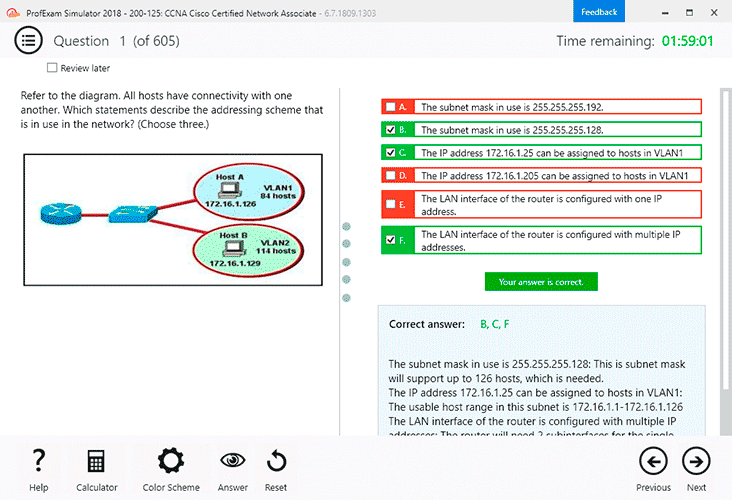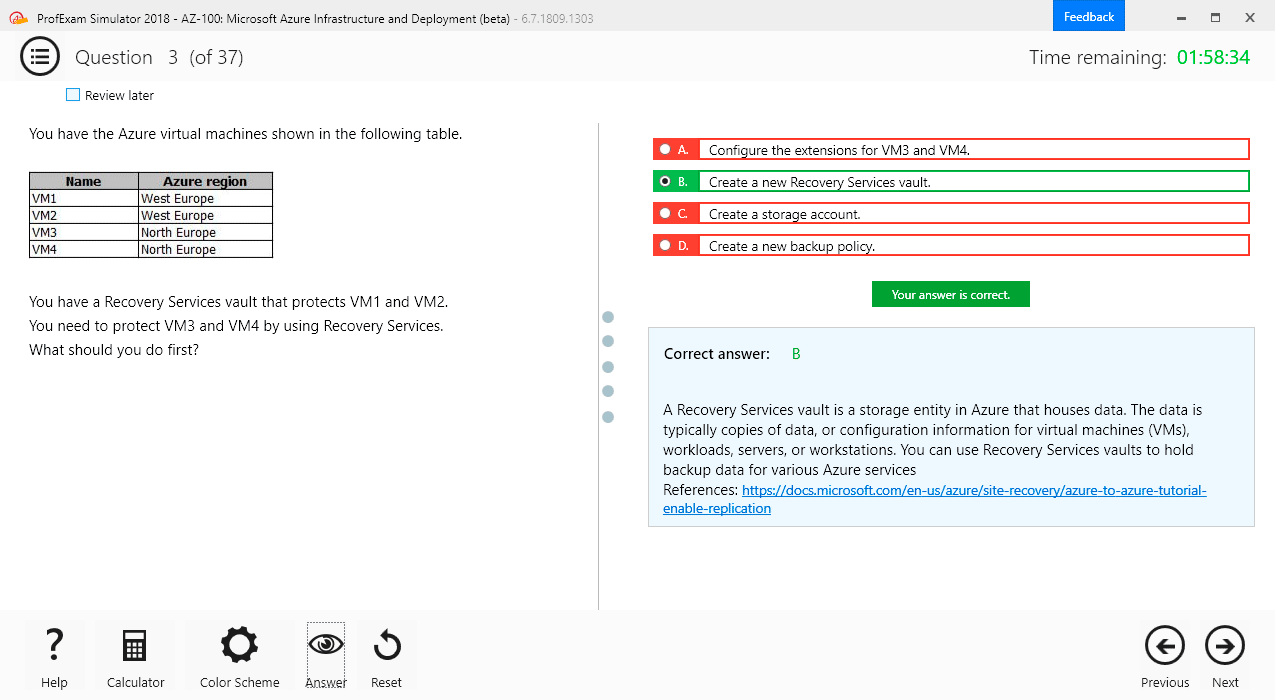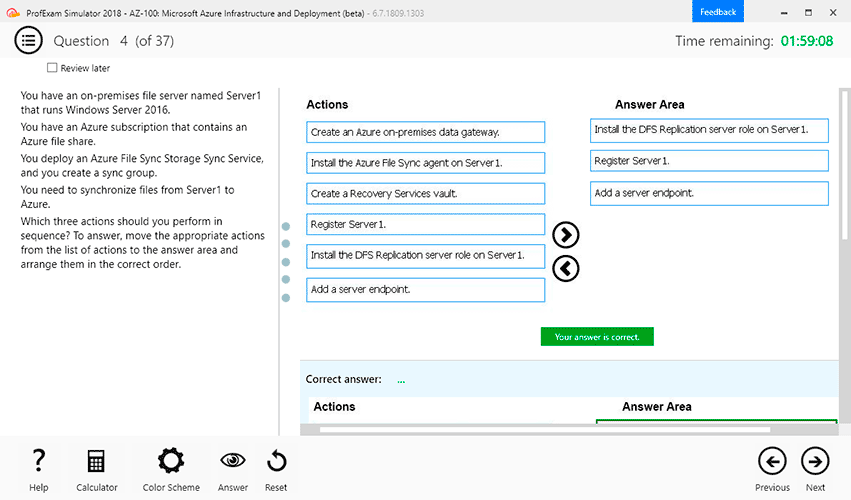File Info
| Exam | Certified Protection Professional |
| Number | CPP |
| File Name | ASIS.CPP.BrainDumps.2019-03-15.136q.vcex |
| Size | 153 KB |
| Posted | Mar 15, 2019 |
| Download | ASIS.CPP.BrainDumps.2019-03-15.136q.vcex |
How to open VCEX & EXAM Files?
Files with VCEX & EXAM extensions can be opened by ProfExam Simulator.
Coupon: MASTEREXAM
With discount: 20%





Demo Questions
Question 1
What happens when you attempt to compile and run the following code?
#include <vector>
#include <iostream>
#include <algorithm>
using namespace std;
class B { int val;
public:
B(int v):val(v)
int getV() const {return val;} bool operator < (const B & v) const { return val<v.val;} };
ostream & operator <<(ostream & out, const B & v) { out<<v.getV(); return out;}
template<class T>struct Out {
ostream & out;
Out(ostream & o): out(o)
void operator() (const T & val ) { out<<val<<" "; } };
int main() {
B t1[]={3,2,4,1,5};
B t2[]={6,10,8,7,9};
vector<B> v1(10);
sort(t1, t1+5);
sort(t2, t2+5);
merge(t1,t1+5,t2,t2+5,v1.begin());
for_each(v1.begin(), v1.end(), Out<B>(cout));cout<<endl;
return 0;
}
Program outputs:
- 1 2 3 4 5 6 10 8 7 9
- 3 2 4 1 5 6 7 8 9 10
- 3 2 4 1 5 6 10 8 7 9
- 1 2 3 4 5 6 7 8 9 10
- compilation error
Correct answer: E
Question 2
What happens when you attempt to compile and run the following code?
#include <vector>
#include <iostream>
#include <algorithm>
using namespace std;
template<class T>struct Out {
ostream & out;
Out(ostream & o): out(o)
void operator() (const T & val ) { out<<val<<" "; } };
int main() {
int t[]={3,2,4,1,5,10,9,7,8,6};
vector<int> v1(t,t+10);
cout<<*max_element(v1.begin(), v1.end());
return 0;
}
Program outputs:
- 3
- 1
- 6
- 10
- compilation error
Correct answer: D
Question 3
What happens when you attempt to compile and run the following code?
#include <iostream>
#include <algorithm>
#include <vector>
#include <deque>
#include <set>
using namespace std;
void myfunction(int i) {
cout << " " << i;
}
int main() {
int t[] = { 10, 5, 9, 6, 2, 4, 7, 8, 3, 1 };
vector<int> v1(t, t + 10);
deque<int> d1(t, t + 10);
set<int> s1(t, t + 10);
for_each(v1.begin(), v1.end(), myfunction); // Line I
for_each(d1.begin(), d1.end(), myfunction); // Line II
for_each(s1.begin(), s1.end(), myfunction); // Line III
return 0;
}
- program outputs: 10 5 9 6 2 4 7 8 3 1 10 5 9 6 2 4 7 8 3 1 1 2 3 4 5 6 7 8 9 10
- program outputs: 10 5 9 6 2 4 7 8 3 1 10 5 9 6 2 4 7 8 3 1 10 5 9 6 2 4 7 8 3 1
- program outputs: 1 2 3 4 5 6 7 8 9 10 1 2 3 4 5 6 7 8 9 10 1 2 3 4 5 6 7 8 9 10
- compilation error in line I
- compilation error in line III
Correct answer: A
Question 4
What happens when you attempt to compile and run the following code?
#include <iostream>
#include <algorithm>
#include <vector>
#include <set>
using namespace std;
void myfunction(int i) {
cout << " " << i;
}
int main() {
int t[] = { 10, 5, 9, 6, 2, 4, 7, 8, 3, 1 };
set<int> s1(t, t+10);
vector<int> v1(s1.rbegin(), s1.rend());
swap_ranges(s1.begin(), s1.end(), v1.begin());
for_each(v1.begin(), v1.end(), myfunction);
for_each(s1.begin(), s1.end(), myfunction);
return 0;
}
Program outputs:
- 10 9 8 7 6 5 4 3 2 1 1 2 3 4 5 6 7 8 9 10
- compilation error
- 1 2 3 4 5 6 7 8 9 10 1 2 3 4 5 6 7 8 9 10
- 1 2 3 4 5 6 7 8 9 10 10 9 8 7 6 5 4 3 2 1
- 10 9 8 7 6 5 4 3 2 1 10 9 8 7 6 5 4 3 2 1
Correct answer: B
Question 5
What happens when you attempt to compile and run the following code?
#include <iostream>
#include <set>
#include <list>
using namespace std;
int main(){
int t[] ={ 1, 1, 2, 2, 3, 3, 4, 4, 5, 5 };
list<int>v(t, t+10);
set<int> s1(v.begin(),v.end());
if (s1.count(3) == 2) {
s1.erase(3);
}
for(set<int>::iterator i=s1.begin();i!= s1.end(); i++) {
cout<<*i<<" ";
}
return 0;
}
- program outputs: 1 2 3 4 5
- program outputs: 1 2 4 5
- program outputs: 1 1 2 2 3 4 4 5 5
- program outputs: 1 1 2 3 3 4 4 5 5
- compilation error
Correct answer: A
Question 6
What happens when you attempt to compile and run the following code?
#include <vector>
#include <iostream>
#include <algorithm>
using namespace std;
template<class T>struct Out {
ostream & out;
Out(ostream & o): out(o)
void operator() (const T & val ) { out<<val<<" "; } };
int main() {
int t1[]={3,2,4,1,5};
int t2[]={5,6,8,2,1};
vector<int> v1(10);
sort(t1, t1+5);
sort(t2, t2+5);
set_union(t1,t1+5,t2,t2+5,v1.begin());
for_each(v1.begin(), v1.end(), Out<int>(cout));cout<<endl;
return 0;
}
Program outputs:
- 3 2 4 1 5 6 8 2 1 0
- 1 2 3 4 5 6 8 2 1 0
- 1 1 2 2 3 4 5 5 6 8
- 1 2 3 4 5 6 8 0 0 0
- compilation error
Correct answer: D
Question 7
What will happen when you attempt to compile and run the code below, assuming that you enter the following sequence: 1 2 3 end<enter>?
#include <iostream>
#include <string>
#include <list>
#include <algorithm>
using namespace std;
template<class T>struct Out {
ostream & out;
Out(ostream & o): out(o)
void operator() (const T & val ) {out<<val<<" "; } };
int main ()
{
list<int> l;
for( ; !cin.bad() ; )
{
int i;
cin>>i;
l.push_back(i);
}
for_each(l.begin(), l.end(), Out<int>(cout));
return 0;
}
Program will output:
- 1 2 3
- 1 2 3 end
- 1
- compilation error
- program runs forever without output
Correct answer: E
Question 8
What happens when you attempt to compile and run the following code?
#include <iostream>
#include <map>
using namespace std;
int main() {
int t[] = { 1, 1, 2, 2, 3, 3, 4, 4, 5, 5 };
string s[] = { "one", "one", "two", "two", "three","three", "four", "four", "five", "five"};
map<int, string> m;
for (int i = 0; i < 10; i++) {
m.push_back(pair<int, string>(t[i], s[i]));
}
for (map<int, string>::iterator i = m.begin(); i != m.end(); i++) {
cout << i?>first << " ";
}
return 0;
}
- program outputs: 1 2 3 4 5
- compilation error
- program outputs: 1 1 2 2 3 3 4 4 5 5
- program outputs: one two three four five
- program outputs: one one two two three three four four five five
Correct answer: B
Question 9
What happens when you attempt to compile and run the following code?
#include <deque>
#include <iostream>
#include <algorithm>
using namespace std;
class B { int val;
public:
B(int v):val(v)
int getV() const {return val;} bool operator < (const B & v) const { return val<v.val;} };
ostream & operator <<(ostream & out, const B & v) { out<<v.getV(); return out;}
template<class T>struct Out {
ostream & out;
Out(ostream & o): out(o)
void operator() (const T & val ) { out<<val<<" "; } };
int main() {
int t[]={8, 10, 5, 1, 4, 6, 2, 7, 9, 3};
deque<B> d1(t, t+10);
sort(d1.begin(), d1.end());
deque<B>::iterator it = upper_bound(d1.begin(), d1.end(), B(4));
for_each(it, d1.end(), Out<B>(cout)); cout<<endl;
return 0;
}
Program outputs:
- 5 6 7 8 9 10
- 4 5 6 7 8 9 10
- 6 7 8 9 10
- 1 2 3 4 5
- 1 2 3 4
Correct answer: A
Question 10
What happens when you attempt to compile and run the following code?
#include <vector>
#include <iostream>
#include <algorithm>
using namespace std;
class B { int val;
public:
B(int v):val(v)
int getV() const {return val;} bool operator < (const B & v) const { return val<v.val;} };
ostream & operator <<(ostream & out, const B & v) { out<<v.getV(); return out;}
template<class T>struct Out {
ostream & out;
Out(ostream & o): out(o)
void operator() (const T & val ) { out<<val<<" "; } };
int main() {
B t1[]={3,2,4,1,5};
B t2[]={5,6,8,2,1};
vector<B> v1(10,0);
sort(t1, t1+5);
sort(t2, t2+5);
set_symmetric_difference(t2,t2+5,t1,t1+5,v1.begin());
for_each(v1.begin(), v1.end(), Out<B>(cout));cout<<endl;
return 0;
}
Program outputs:
- 6 8 3 4 0 0 0 0 0 0
- 3 4 0 0 0 0 0 0 0 0
- 6 8 0 0 0 0 0 0 0 0
- compilation error
- 3 4 6 8 0 0 0 0 0 0
Correct answer: E

